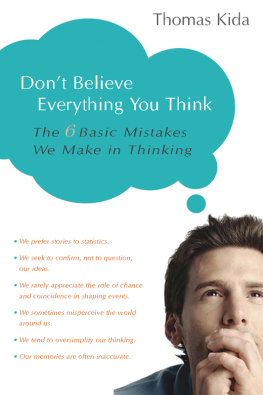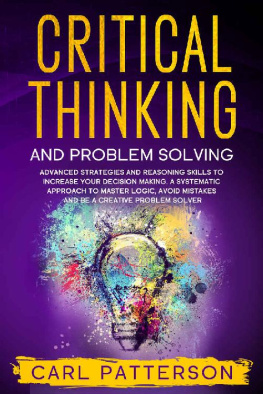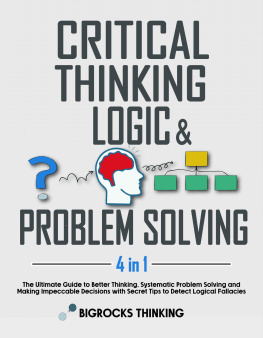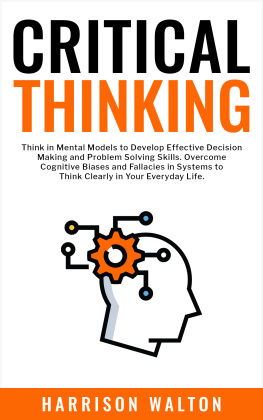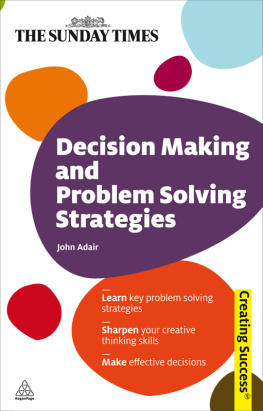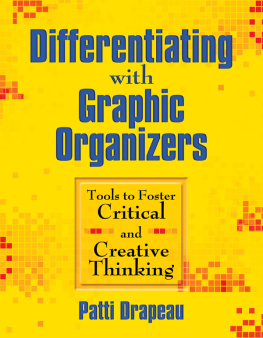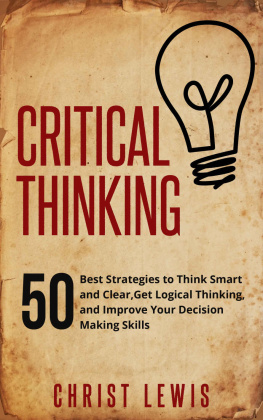
As with most works, this book was not written in a vacuum. Rather, it's based upon the research and writing of many creative thinkers who have come before. I've tried to write the book in an easygoing, conversational style to make the topics readable and interesting to a wide audience. In fact, it's written to be a simple introduction to how we think and how our thinking can go wrong. If the topics discussed here pique your interest, I heartily recommend the following authors and researchers for a more in-depth discussion of specific issues.
The work of Carl Sagan and Michael Shermer provide the foundation for much of the discussion on science and pseudoscience, and the importance of skeptical and critical thinking. Carl Sagan's superb book The Demon Haunted World: Science as a Candle in the Dark is must reading for anyone interested in critical thinking. Michael Shermer wrote the excellent book Why People Believe Weird Things and is the publisher of the magazine Skeptic. The world would be a better place if every household received a copy of Skeptic and Skeptical Inquirer, a similar publication produced by the Committee for the Scientific Investigation of Claims of the Paranormal. I've also drawn on the excellent work of Theodore Schick and Lewis Vaughn's How to Think about Weird Things, Keith Stanovich's How to Think Straight about Psychology, and Stuart Vyse's Believing in Magic: The Psychology of Superstition.
In the area of decision making, I owe a debt to Scott Plous's superb book The Psychology of Judgment and Decision Making, Tom Gilovich's How We Know What Isn't So, and Stuart Sutherland's Irrationality: Why We Don't Think Straight. Specifically relating to memory, Daniel Schacter's The Seven Sins of Memory and the work of Elizabeth Loftus (e.g., The Myth of Repressed Memory, with Katherine Ketcham) were essential. William Sherden's The Fortune Sellers, Barry Glassner's The Culture of Fear, and Burton Malkiel's A Random Walk Down Wall Street are also fascinating books that were used in various chapters. Much of the discussion of how we make decisions is based upon the research of psychologists such as Amos Tversky, Daniel Kahneman, as well as innumerable others. My debt to these researchers and others referenced throughout cannot be overestimated.
On a more personal note, I'm grateful to many people who have helped in the development of the book. Linda Regan, my editor, believed in the book from the first time she saw the idea, and was the kind of insightful editor I had hoped to work with. Jim Smith and Kathie Sullivan provided many valuable comments that improved the manuscript, and were always there to discuss the never-ending issues that came up. In addition, I would like to thank Chris and Alicia Agoglia, Erin Moore, Ken Ryack, Tracey Riley, Ben Luippold, Steve Gill, Bill Wooldridge, Ron Karren, Lou Wigdor, Dave and Joe Goulet, and Gene Myer for their comments and assistance. Thanks also to my friends who were the inspiration for many of the stories that have livened up the book, especially the Ingari clan and the Thursday afternoon happy hour crew. And, of course, thanks to Charliefor being Charlie. I'd also like to thank my colleagues at the University of Massachusetts, especially Dennis Hanno, Ron Mannino, and Tom O'Brien, for providing an atmosphere that allowed me to pursue my interest in critical thinking and decision making.
Finally, I thank my family, to whom this book is dedicatedKathie, Elaine, Gene, Doug, Roland, Jimmy, Dave, Joe, and, of course, Mom and Dad. Our Saturday night bull sessions, which provided many ideas for the book, have been a constant joy. I'm glad we're going through this life together. I'd especially like to thank Kathiefor everything.

It is not disbelief that is dangerous to our society, it is belief.
George Bernard Shaw
On a popular local radio station, three morning show personalities were talking with a frequent guest. Unbelievable! Amazing! That's how they described their guest's incredible ability. In fact, they urged their audience to get to one of her seminars as soon as possible. Why? Because she can talk with the dead. Now these talk-show hosts are critical of many things; they often try to uncover the folly in what other people say or do. However, they were completely taken with the psychic. So were their listeners. Caller after caller was amazed by what she saidsome even cried upon hearing what they thought were the words of their deceased loved ones.
You're at the hospital with severe abdominal pain. While lying on the examination table, a nurse enters the room, places her hands several inches above your body, and begins moving them in a gentle, wavelike motion, starting at your head and progressing slowly down your torso. What are you doing? you ask. I'm driving the negative energy from your body, she says. It's what's causing your pain. Sound a bit crazy? That wouldn't happen, would it? Well, it could. The nurse is practicing a technique called therapeutic touch. More than forty thousand nurses have
My good friend Joe is a geologist. He runs a water exploration company and travels the world finding drinkable water for towns, cities, and even small countries. He uses the most advanced technology, from complex computer models to satellite imagery, to locate high-output wells. Joe is very successful at what he does. In some areas of the Caribbean he has achieved an almost godlike status for his ability to find water where no one else could. Joe is one of the most intelligent individuals I know. And yet, at one point in his career, he used dowsing in his water exploration. Dowsing is a technique in which an individual holds an object, like a Y-shaped tree branch, and walks around the land in search of water. When the branch twitches, it's taken as a sign that water is below. Joe met a professional dowser while working in New England and became convinced that it works. In fact, many years ago when I bought some land to build a house he came over, dowsed the land, and told me where to drill.
What do these cases have in common? Very bright, capable, highly trained people are holding extraordinary beliefs that have little or no credible supporting evidence. In fact, the evidence indicates the reversetalking with the dead, therapeutic touch, and dowsing don't work (my well has never yielded much water), but smart people continue to believe. It happens to medical professionals, successful businesspeople, scientists, and to you and me. Now you may say, I wouldn't believe in such bizarre things. But what about other beliefs that may, on the surface, seem more plausible? Consider the case of facilitated communication.
SOUNDS REASONABLE, DON'T YOU THINK?
Your friend has an autistic child. Autism is a medical condition in which children can be unresponsive, aloof, and seem incapable of forming relationships with others. One's heart goes out to the children and parents affected by such a debilitating condition. Then there appears to be something that can help. Your friend recently told you of a fantastic new discovery that has enabled him to talk with his child. He says the technique, called facilitated communication, has demonstrated that autistic children are quite intelligent, and that their main problem centers simply around their inability to communicate. Delighted for your friend and intrigued by this breakthrough, you decide to learn more about the technique.
You find that facilitated communication has been used since the 1970s, when a teacher discovered that if you provide physical assistance to a severely autistic child, by holding their hand or arm to a typewriter or computer keyboard, the child will type out coherent, intelligent thoughts. Apparently, hidden beneath the impaired exterior of an autistic child lay a very capable mind that would demonstrate considerable intellect if put in a situation enabling him to communicate. In effect, facilitated communication demonstrated that severely autistic children have communication problems that are primarily caused by physical, rather than mental, limitations.
Next page
